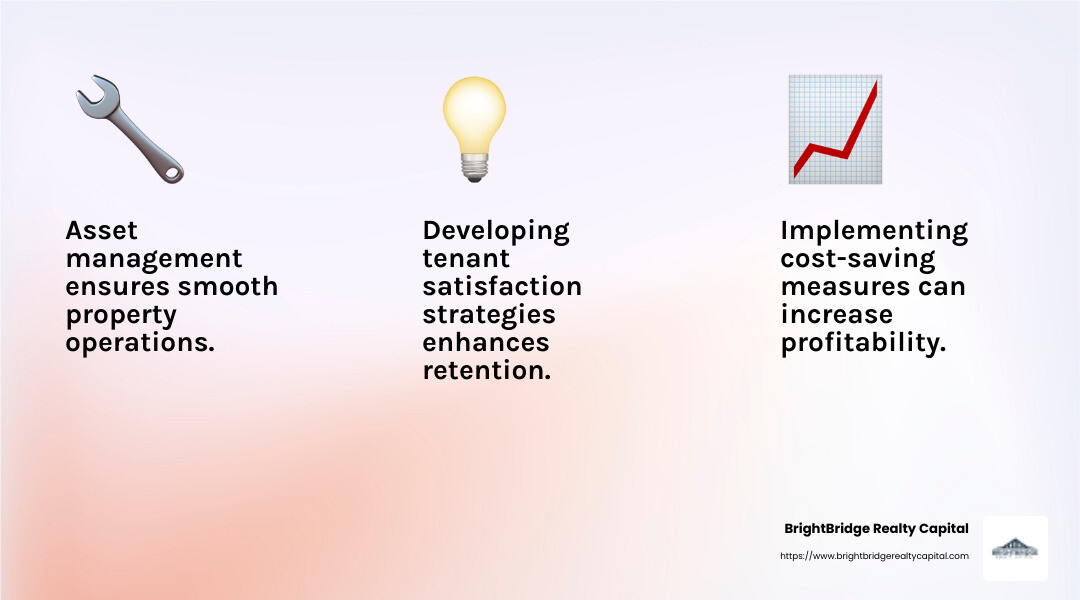The Financial Frontier: A List of Essential Real Estate Services

Real estate financial services play a pivotal role in today's property market. Whether you are seeking financing, investment advice, or transaction support, these services offer the backbone for success in the real estate landscape. Here's why they matter:
- Financing Solutions: Providing the capital needed for buying and developing properties.
- Investment Advisory: Guiding investors through complex market dynamics.
- Transaction Support: Ensuring smooth and efficient property transactions.
Real estate financial services impact everything from urban development to personal investments, shaping the future of how we live and work. These services cover a broad spectrum, from mortgage lending and construction loans to investment banking and advisory services.
Urbanization and infrastructure gaps are pushing real estate, once purely an investment issue, into the spotlight as a strategic concern for both companies and governments. Understanding these financial services is essential for navigating the real estate frontier.

Understanding Real Estate Financial Services
Real estate financial services are the backbone of the property market, offering essential support in financing, mortgage lending, and investment. Let's break down these components to see how they function and why they're crucial.
Financing: The Fuel for Real Estate
Financing in real estate is all about providing the necessary funds to purchase or develop properties. This can include everything from construction loans for new buildings to bridge loans that help cover gaps between buying and selling properties.
Construction Loans: These are short-term loans that cover the costs of building a property. They typically convert to a mortgage once construction is complete.
Bridge Loans: These loans provide temporary funding to bridge the gap between the purchase of a new property and the sale of an old one.
These financing options are vital for developers and investors who need flexible solutions to manage cash flow.
Mortgage Lending: Open uping Home Ownership
Mortgage lending is the process of providing loans to individuals or businesses to purchase real estate. This service is critical for most homebuyers, as it allows them to afford properties by paying over time.
Fixed-Rate Mortgages: These loans have a set interest rate over the life of the loan, offering stability in monthly payments.
Adjustable-Rate Mortgages (ARMs): These loans start with lower interest rates that adjust over time based on market conditions.

Mortgage lending isn't just about buying homes; it's also about refinancing existing loans, which can help homeowners lower their interest rates or monthly payments.
Investment: Building Wealth Through Real Estate
Investing in real estate involves purchasing properties to generate income or profit. This can be through renting, selling at a higher price, or both.
Real Estate Investment Trusts (REITs): These are companies that own, operate, or finance income-generating real estate. They offer a way to invest in real estate without buying property directly.
Private Equity Real Estate Funds: These funds pool money from investors to purchase and manage real estate assets, aiming for high returns.
Investment in real estate is not just about buying and selling properties. It's about strategic planning and understanding market trends to maximize returns.
Real estate financial services offer a comprehensive suite of solutions for financing, mortgage lending, and investment. They are essential for anyone looking to steer the complex world of real estate, providing the tools needed to succeed in this dynamic market.
Essential Real Estate Services
In real estate, having the right services can make all the difference. Let's explore three key areas: transaction advisory, portfolio management, and asset management. These services are crucial for navigating the complex world of real estate.
Transaction Advisory
Transaction advisory is all about guiding clients through the buying, selling, or leasing of real estate. This service helps ensure that every deal is sound and beneficial.
Imagine you're buying an apartment complex. A transaction advisor would:
- Assess the property's value to ensure you're paying a fair price.
- Identify potential risks and liabilities, such as zoning issues or environmental concerns.
- Negotiate terms to get the best deal possible.
With expert guidance, you can make informed decisions that align with your goals.
Portfolio Management
Portfolio management involves overseeing a collection of real estate assets to maximize returns and minimize risks. This service is essential for investors with multiple properties.
Consider a real estate investor with properties spread across New York. A portfolio manager would:
- Analyze market trends to determine which properties are performing well.
- Recommend strategic actions, such as selling underperforming assets or acquiring new ones.
- Optimize asset allocation to balance risk and return.
By actively managing your portfolio, you can achieve steady growth and financial stability.
Asset Management
Asset management focuses on the day-to-day operations and long-term strategy of individual properties. It's about enhancing property value and ensuring smooth operations.
For instance, you own a commercial building. An asset manager would:
- Oversee property maintenance to keep it in top condition.
- Implement cost-saving measures to improve profitability.
- Develop strategies to increase tenant satisfaction and retention.

With effective asset management, properties become more attractive to tenants and investors alike.
Together, transaction advisory, portfolio management, and asset management form the backbone of successful real estate operations. These services provide the expertise needed to steer the market efficiently and effectively.
Up next, we'll explore the key players and offerings in real estate financial services.
Real Estate Financial Services: Key Players and Offerings
In the dynamic world of real estate, financial services play a pivotal role. Let's explore three essential components: mortgage banking, equity placement, and structured finance. These offerings are crucial for anyone looking to steer the real estate market successfully.
Mortgage Banking
Mortgage banking is at the heart of real estate financing. It involves arranging loans for property purchases, whether residential or commercial. Mortgage bankers work with a network of lenders to find the best terms for their clients.
Imagine you're a first-time homebuyer in New York. A mortgage banker would:
- Evaluate your financial situation to determine how much you can borrow.
- Shop around for competitive loan rates to save you money.
- Guide you through the application process to avoid common pitfalls.
By leveraging their expertise, you can secure the financing needed to make your real estate dreams a reality.
Equity Placement
Equity placement involves sourcing and securing investment capital for real estate projects. This service is vital for developers and investors seeking to fund large-scale ventures.
Consider a developer planning a new residential complex. An equity placement specialist would:
- Identify potential investors interested in backing the project.
- Structure investment deals that align with both the developer's and investors' goals.
- Facilitate negotiations to ensure a mutually beneficial agreement.
With the right equity placement, projects can move forward smoothly, attracting the necessary capital for success.
Structured Finance
Structured finance is all about creating complex financial instruments to meet specific investment needs. This offering is key for large transactions that require customized solutions.
Picture a real estate investment firm looking to acquire a portfolio of office buildings. A structured finance expert would:
- Design financial models to optimize funding strategies.
- Combine various financial products such as mezzanine debt and preferred equity.
- Mitigate risks by balancing different financial components.
Structured finance provides the flexibility needed to tackle intricate real estate deals, ensuring they are both viable and profitable.
Together, these real estate financial services—mortgage banking, equity placement, and structured finance—form the backbone of successful real estate ventures. They provide the tools and expertise needed to thrive in a competitive market.
Next, we'll dive into the innovative solutions shaping the future of real estate financial services.
Innovative Solutions in Real Estate Financial Services
In the changing landscape of real estate, innovative solutions are critical. They address emerging challenges and leverage new opportunities. Here, we'll explore three key areas: risk management, strategic investments, and fintech.
Risk Management
Risk management is essential in real estate to protect investments from unforeseen events. Real estate financial services employ several strategies to manage risk effectively:
Diversification: By spreading investments across different regions and asset classes, firms can reduce the impact of market downturns. For example, investing in both residential and commercial properties can provide balance if one sector faces challenges.
Conservative Underwriting: Setting reasonable loan-to-value limits and enforcing loan covenants help guard against credit losses. These measures ensure that loans are given to borrowers who are more likely to repay.
Environmental and Legal Due Diligence: Conducting thorough assessments helps prevent environmental liabilities or legal disputes that could cut into returns. As noted in the research, these issues can delay projects and reduce profitability.
Strategic Investments
Strategic investments focus on maximizing returns and supporting growth. They involve carefully planned actions to improve value:
Real Estate Equity Management: This involves managing and optimizing real estate equity investments to achieve the best possible returns. By leveraging local expertise and deep community ties, firms can make informed decisions that align with market trends.
Sustainability and ESG Factors: Incorporating environmental, social, and governance (ESG) practices into operations is becoming increasingly important. These practices not only contribute to social good but also attract investors who prioritize sustainability.
Fintech
Fintech is revolutionizing the real estate financial services industry. It introduces technology-driven solutions that streamline processes and improve efficiency:
Digital Platforms: Platforms like Loanzify simplify mortgage financing by guiding users through the process and connecting them with loan officers. This reduces the complexity of obtaining a loan and speeds up the process.
Data Analytics: Real-time data and analytics are used to make informed decisions, manage risks, and optimize investment strategies. For example, analyzing market trends can help predict future property values and rental income potential.
Blockchain Technology: Blockchain offers secure and transparent transaction processing, reducing the risk of fraud and errors. This technology can also facilitate faster and more efficient property transactions.
By embracing these innovative solutions, real estate financial services can stay ahead of the curve. They offer the tools needed to steer challenges and seize opportunities in a competitive market.
Next, let's address some frequently asked questions about real estate financial services.
Frequently Asked Questions about Real Estate Financial Services
What are the main types of real estate financial services?
Real estate financial services cover a wide range of offerings that help individuals and businesses manage their property investments. The main types include:
Financing: This involves providing loans to purchase or develop properties. Options range from traditional mortgages to more specialized products like construction loans or bridge financing.
Advisory: Firms provide expert advice on transactions, helping clients make informed decisions. This includes guidance on buying, selling, or leasing properties, as well as portfolio management.
Investment: These services focus on growing wealth through real estate. They involve strategies like equity placement, where investors buy shares in properties, or structured finance, which involves complex financial products.
How do real estate financial services benefit investors?
Investors gain several advantages from using real estate financial services:
Growth: By leveraging expert advice and innovative solutions, investors can maximize returns and expand their portfolios. For example, strategic investments in high-growth areas can lead to significant appreciation.
Connections: Real estate services often come with access to a network of industry professionals. This network can provide valuable insights and opportunities that might not be available otherwise.
Competitive Edge: With the right services, investors can stay ahead of market trends and make timely decisions. This competitive edge is crucial in a industry where conditions can change rapidly.
What should I consider when choosing a real estate financial service provider?
Selecting the right provider for real estate financial services is critical. Here are key factors to consider:
Experience: Look for providers with a proven track record in the industry. Experienced firms are more likely to offer reliable advice and effective solutions.
Network: A strong network can open doors to exclusive deals and partnerships. Providers with extensive connections can help you access properties and investment opportunities that others might miss.
Flexibility: The ability to adapt to changing market conditions and client needs is vital. Choose a provider that offers customizable solutions custom to your specific goals and circumstances.
By understanding these aspects, you can make informed decisions about which services will best support your real estate endeavors.
Conclusion
In the dynamic world of real estate, having a reliable partner can make all the difference. BrightBridge Realty Capital stands out by offering custom solutions that cater to your unique investment needs. Whether you're flipping a property, building from the ground up, or expanding a rental portfolio, we provide the real estate financial services you need to succeed.
What sets us apart? Our commitment to fast closings. We understand that time is of the essence in real estate transactions. That's why we streamline our processes to ensure you receive funding quickly, often within a week. By cutting out intermediaries, we offer competitive rates and a seamless experience from start to finish.
Our customized solutions mean you won't find a one-size-fits-all approach here. We work closely with you to understand your goals and challenges, crafting financial strategies that fit your specific situation. This personalized attention ensures you have the tools to steer the market effectively and capitalize on opportunities as they arise.
For more information on how BrightBridge Realty Capital can support your real estate ventures, explore our services. Let us be your partner in crossing the financial frontier.


